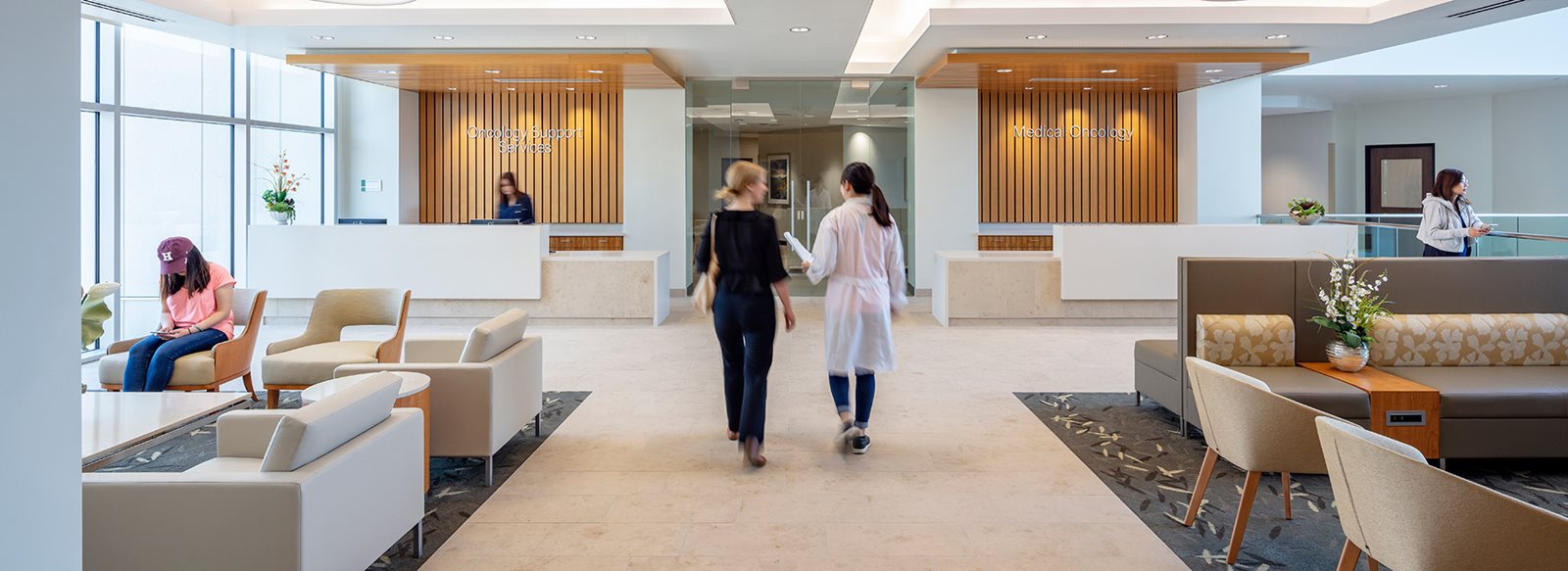
Cancer Care (hm) Menu
Cancer Care (hm) Menu
While there are some things you can do to reduce your chances of getting cancer — like maintaining a healthy weight, exercising regularly, eating well, limiting alcohol and staying away from tobacco — early detection and annual screenings are also critical.
Early detection is important because by the time symptoms appear, cancer may have already spread. When abnormal tissue or cancer is found early, it may be easier to treat.
In addition to genetics consultation and testing, we offer lung cancer and breast cancer screenings.
Genetics Consultation & Testing
If you or a family member has been diagnosed with cancer, evaluating your genetic makeup can give you valuable information that will help you and your doctors make more informed decisions about your care — now and in the future.
Genetic Consultation
This involves a detailed evaluation of you and your family’s medical histories with a trained genetics professional.
Genetic consultation:
- Helps determine the best treatment and future risk management strategies for those who have already been diagnosed with cancer
- Assesses a person’s risk for developing cancer based on their family history of cancer
- Establishes screening and management recommendations to lower risk and detect cancer early
- Determine whether gene (DNA) testing is appropriate for you or your family member
Genetic Testing
Genetic testing looks at your genes to determine your risk and reveal if relatives have an increased risk of cancer. In some cases, genetic testing results can help determine treatment options for those newly diagnosed with cancer.
Genetic consultation for cancer risk may be helpful if you:
- Were diagnosed with breast cancer before age 50 or ovarian cancer at any age
- Have a personal or family history of colon cancer, especially before age 60
- Are of Ashkenazi Jewish descent and have a family history of cancer
- Have had two or more different types of cancer yourself
- Have one or more close relatives who have had cancers at young ages, especially if those cancers may be linked (such as breast and ovarian)
- Have multiple, close relatives who were diagnosed with cancer before age 50, even if the cancers were of different types
Want more information about genetics testing? Ask your doctor or healthcare provider to refer you for an oncology genetics consultation or call us at (559) 387-1600 for more information.
Breast Cancer Screenings
Researchers have identified several genes that greatly increase a person's risk of developing breast and ovarian cancer. These breast-ovarian predisposition genes are known as BRCA genes (BRCA1) and (BRCA2).
Abnormalities or mutations in these genes result in a high risk of breast and ovarian cancer. Identifying who has this gene will provide valuable information on how to monitor and prevent cancer from developing.
Risk Assessment Screening Program
The Risk Assessment Screening Program at the Marjorie E. Radin Breast Care Center helps women evaluate their risk for breast cancer. Our nurse coordinators and genetic counselor can provide you and your family with:
- A breast cancer risk assessment
- Genetic counseling and testing (as indicated)
- A personalized screening and prevention plan
- Referrals to breast care specialists in collaboration with your primary care provider
For more information about the Risk Assessment Screening Program at the Radin Breast Care Center, call (559) 324-3774.
Digital Mammography
The Radin Breast Care Center is a designated a Center of Excellence by two leading organizations — the National Quality Measures for Breast Centers™ (NQMBC) and American College of Radiology (ACR) — because of its expertise in diagnosing breast cancer.
If your mammogram or ultrasound finds breast cancer, at the Radin Center you have quick and easy access to our team of specialists. We also accept referrals from other diagnostic centers.
Lung Cancer Screening Program
Recognized and accredited by the National Radiology Data Registry — the only program of its kind in the area — we partner with UCSF Fresno to screen for and detect lung cancer as early as possible.
Because of our national accreditation, we're able to deliver a comprehensive lung cancer screening program that includes annual screenings, patient education resources, as well as enrollment in smoking-cessation programs.
To be eligible for our program, you must meet this criteria:
- Adult age 55 to 77 years
Who has a 30-year history of smoking a pack a day
Currently smoke or have quit within the past 15 years
Once enrolled, all patients are very carefully followed by the lung cancer screening team throughout their screening period.
For more information or to schedule an appointment, please speak with your primary care provider or contact our Lung Cancer Screening Program at (559) 224-LUNG (5864), option 2, or by email at CRMCLungScreening@CommunityMedical.org.
Colorectal Cancer Screening Can Save Your Life
The Importance of Screening for Cervical Cancer
We use cookies and other tools to optimize and enhance your experience on our website. View our Privacy Policy.

